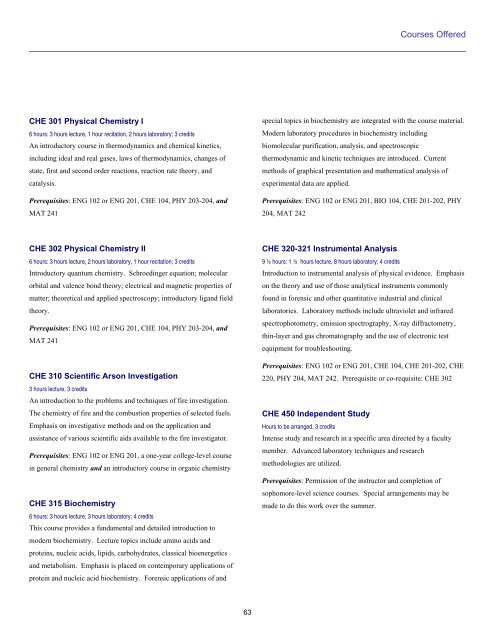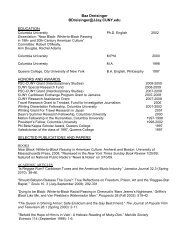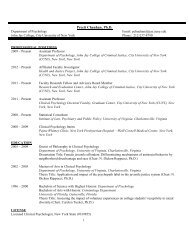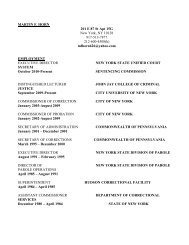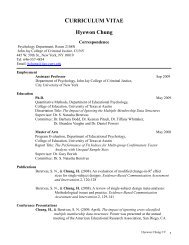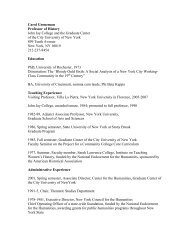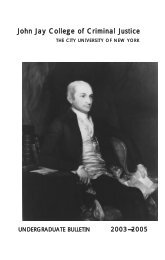Bulletin - John Jay College Of Criminal Justice - CUNY
Bulletin - John Jay College Of Criminal Justice - CUNY
Bulletin - John Jay College Of Criminal Justice - CUNY
You also want an ePaper? Increase the reach of your titles
YUMPU automatically turns print PDFs into web optimized ePapers that Google loves.
Courses <strong>Of</strong>fered<br />
CHE 301 Physical Chemistry I<br />
6 hours: 3 hours lecture, 1 hour recitation, 2 hours laboratory; 3 credits<br />
An introductory course in thermodynamics and chemical kinetics,<br />
including ideal and real gases, laws of thermodynamics, changes of<br />
state, first and second order reactions, reaction rate theory, and<br />
catalysis.<br />
Prerequisites: ENG 102 or ENG 201, CHE 104, PHY 203-204, and<br />
MAT 241<br />
special topics in biochemistry are integrated with the course material.<br />
Modern laboratory procedures in biochemistry including<br />
biomolecular purification, analysis, and spectroscopic<br />
thermodynamic and kinetic techniques are introduced. Current<br />
methods of graphical presentation and mathematical analysis of<br />
experimental data are applied.<br />
Prerequisites: ENG 102 or ENG 201, BIO 104, CHE 201-202, PHY<br />
204, MAT 242<br />
CHE 302 Physical Chemistry II<br />
6 hours: 3 hours lecture, 2 hours laboratory, 1 hour recitation; 3 credits<br />
Introductory quantum chemistry. Schroedinger equation; molecular<br />
orbital and valence bond theory; electrical and magnetic properties of<br />
matter; theoretical and applied spectroscopy; introductory ligand field<br />
theory.<br />
Prerequisites: ENG 102 or ENG 201, CHE 104, PHY 203-204, and<br />
MAT 241<br />
CHE 310 Scientific Arson Investigation<br />
3 hours lecture, 3 credits<br />
An introduction to the problems and techniques of fire investigation.<br />
The chemistry of fire and the combustion properties of selected fuels.<br />
Emphasis on investigative methods and on the application and<br />
assistance of various scientific aids available to the fire investigator.<br />
Prerequisites: ENG 102 or ENG 201, a one-year college-level course<br />
in general chemistry and an introductory course in organic chemistry<br />
CHE 315 Biochemistry<br />
6 hours: 3 hours lecture, 3 hours laboratory; 4 credits<br />
This course provides a fundamental and detailed introduction to<br />
modern biochemistry. Lecture topics include amino acids and<br />
proteins, nucleic acids, lipids, carbohydrates, classical bioenergetics<br />
and metabolism. Emphasis is placed on contemporary applications of<br />
protein and nucleic acid biochemistry. Forensic applications of and<br />
CHE 320-321 Instrumental Analysis<br />
9 ½ hours: 1 ½ hours lecture, 8 hours laboratory; 4 credits<br />
Introduction to instrumental analysis of physical evidence. Emphasis<br />
on the theory and use of those analytical instruments commonly<br />
found in forensic and other quantitative industrial and clinical<br />
laboratories. Laboratory methods include ultraviolet and infrared<br />
spectrophotometry, emission spectrography, X-ray diffractometry,<br />
thin-layer and gas chromatography and the use of electronic test<br />
equipment for troubleshooting.<br />
Prerequisites: ENG 102 or ENG 201, CHE 104, CHE 201-202, CHE<br />
220, PHY 204, MAT 242. Prerequisite or co-requisite: CHE 302<br />
CHE 450 Independent Study<br />
Hours to be arranged, 3 credits<br />
Intense study and research in a specific area directed by a faculty<br />
member. Advanced laboratory techniques and research<br />
methodologies are utilized.<br />
Prerequisites: Permission of the instructor and completion of<br />
sophomore-level science courses. Special arrangements may be<br />
made to do this work over the summer.<br />
63


